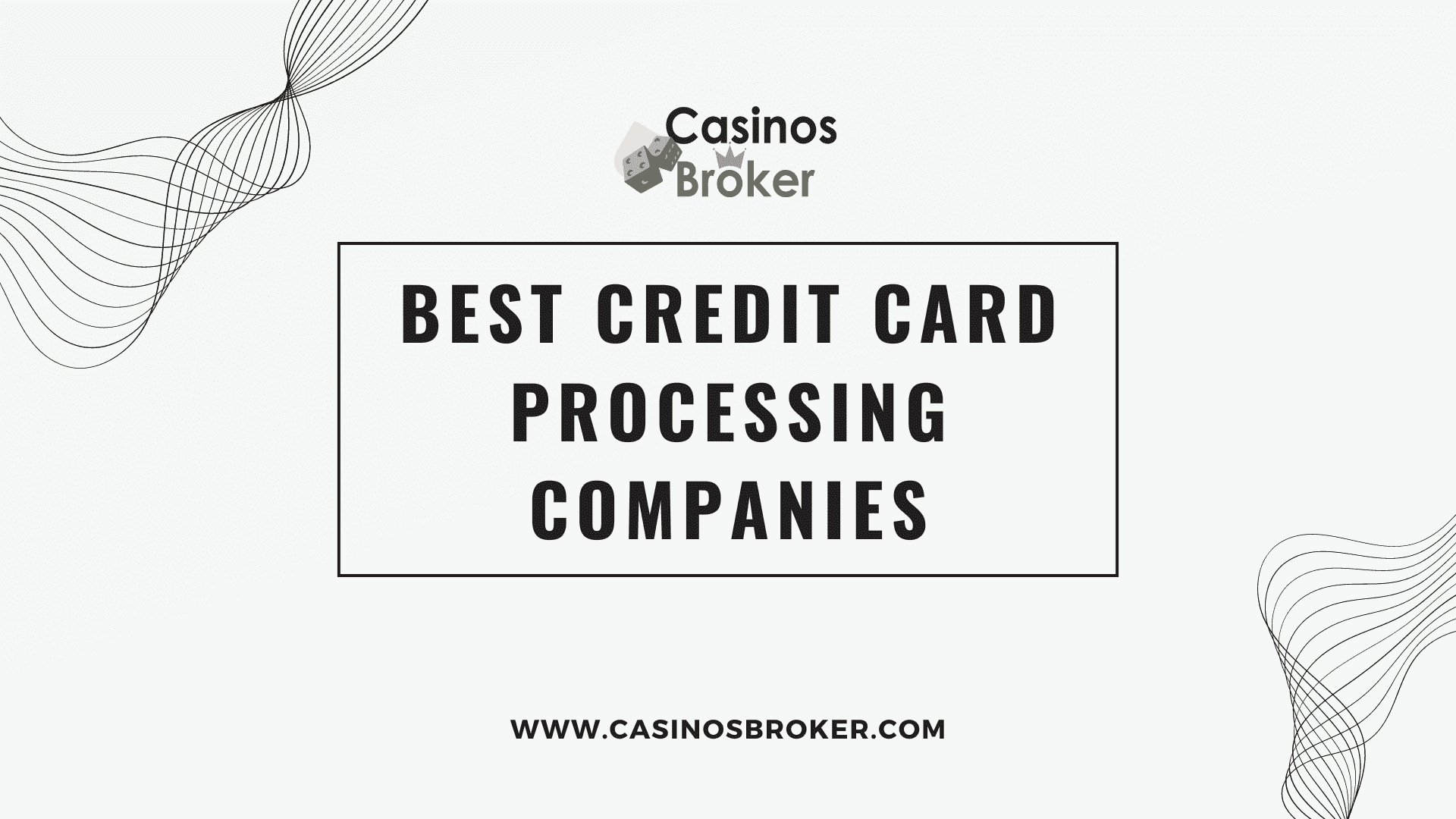For small and large businesses alike, selecting the finest credit card processing firms is essential to easily facilitating online, mobile, and in-store payments. Similarly, merchant accounts are necessary for business owners to open accounts.
What Is a Credit Card Processing Company?
Three items are required for businesses that take credit card payments: payment gateways, payment processors, and merchant accounts. To put it simply, credit card payment processing firms are outside service providers that handle payments with debit or credit cards. They serve as an intermediary between card networks, cardholders, and companies or retailers. The processor facilitates the transfer of funds from a cardholder’s account to the business bank account of the merchant.
Businesses can assist credit card users pay using a physical POS card terminal or guarantee seamless online payments by collaborating with well-known merchant account providers. You would be forced to accept cash payments if you ran a business without access to a credit or debit card processor. In the digital age where many individuals use bank cards, this is definitely not ideal.

Top 10 Credit Card Payment Processors
The amount of credit card transactions worldwide is increasing, and with it, so is the number of merchants requiring payment processors. It is critical for online and physical businesses to be aware of the credit card payment processing providers. It’s preferable to collaborate with businesses that provide complete merchant accounts for the optimal experience.
In order to avoid selecting pricey payment processing services, small business owners should research the related fees before committing to a credit card processing agreement. Having stated that, let’s examine the top credit card processors on the market right now.
Worldpay – Best for Platforms, SMBs, and Enterprises
If you want to use credit cards to make, receive, or handle local and international payments, Worldpay has you covered. This is one of the best merchant account providers and payment processors for platforms, marketplaces, small and medium-sized businesses (SMBs), and large corporations. Businesses from all around the world have already profited from WorldPay. The world’s top retail, aviation, digital, gaming, and internet businesses are served by the payment processor. This is a list of the features that WorldPay provides.
- Mobile card readers for on-the-go payments,
- Contactless functionality, virtual terminal, and payment gateway
- Complementary benefits and savings,
- Online, mobile, and in-store payments,
- Safe countertop card reader with round-the-clock, committed customer support.
In addition, 126 currencies and over 300 other payment methods are accepted by WorldPay in 146 nations. Consequently, a cardholder can conveniently utilize their favored digital wallet, card, and other payment options. Furthermore, all an organization needs to make payments with WorldPay is a straightforward API integration. Regarding the negatives, we’ve observed that a lot of people have been complaining about poor customer service on various review websites.
Pricing
The cost of using Worldpay’s services will vary depending on your industry or merchant category, average transaction value, and annual card turnover. To find your online pricing quote, utilize the website’s online calculator.
Stripe – Suitable for Online Businesses
For online businesses, Stripe provides top-notch credit card payment processing solutions. Many integrations with tailored price plans for retailers receiving high volumes of payments are included in its platform. Additionally, Stripe takes all widely used payment methods, such as e-wallets, debit cards, and credit cards. It’s a fantastic option for multichannel organizations because it provides both online and in-person payment alternatives. Businesses using Stripe can take advantage of these services.
- Precertified Stripe card readers that are PCI compliant,
- More than 100 different payment options
- Personalized in-person checkout using SDKs and APIs
- Solutions for banking as a service and sales tax collection in more than 40 locations.
Additionally suggested for businesses searching for the top merchant service providers is Stripe. These consist of SaaS companies, platforms, marketplaces, e-commerce sites, enterprises, and startups. The primary drawback is the high cost of premium support plans.
Pricing
With no startup costs, additional costs, or monthly charges, Stripe provides a typical pay-as-you-go payment system. Users can pay the same fee using the platform’s integrated per-transaction pricing mechanism, irrespective of the payment method they use. There are other choices for customized pricing. The prices and fees for Stripe are summarized as follows:
- Pay as you go standard: 2.9% + 30¢
- Processing cards in person: 2.7% + 5 (plus 1.5% for foreign cards)
- Card readers: the Stripe Reader M2 starts at $59.00.
- Tap to pay: Each authorization costs 10¢.
- Five cents per authorization for point-to-point encryption
- Payments made internationally (across borders): 1% + 30¢ + 1% for currency conversion
Square – Great for Mobile Businesses
One of the best merchant service companies for companies looking to take credit card payments online is Square. It also provides options for in-store payments. Small businesses who need to enable secure mobile payments are the ideal candidates for the company’s payment system. Let’s examine what Square partners might anticipate from their retailers.
- POS and mobile card reader,
- Enable contactless, PIN, and chip payments.
- Virtual terminals free of charge each month,
- Payment buttons to improve the checkout process
- Free invoicing software with payment API interfaces.
Retailers, restaurants, and beauty parlors are Square’s main priority. Large corporations, franchises, and professional service providers are all considered in the design of the company’s financial services. You can create an online store, maintain inventory, issue invoices or payment links, and get your money fast with Square’s assistance. Nevertheless, high-volume businesses may find the pricing unsatisfactory.
Pricing
Square charges processing costs; there are neither setup nor monthly fees. For each payment option, the organization gives a single rate. In addition to processing fees, retailers who require extra capabilities can opt for the Plus package, which costs $29 in total. For customized plans, they can also select the Premium option. Having said that, the following fees are relevant for each transaction:
- 2.6% + 10% in-person; 2.9% + 30% online
- Bills: 3.3% + 30¢
- Manually inputted 3.5% plus 15¢
- Pay later (6% + 30¢) or buy now.
Zettle by PayPal – Best for Merchants with a PayPal Business Account
One of the top providers of credit card processing services for small businesses is Zettle by PayPal, which was established in 2010. Originally called iZettle, the business was purchased by PayPal in 2018. With a feature-rich app, it offers an all-in-one point-of-sale solution. Retailers and merchants in the food and drink sector are among the businesses that can profit from the company’s point-of-sale systems. See the following advantages of utilizing Zettle by PayPal:
- POS systems that may be tailored for retailers,
- A user-friendly point-of-sale program,
- Readable sales reports,
- A mobile contactless payment card reader,
- A payment terminal for in-person transactions,
- Smooth accounting software integration,
- Integrating e-commerce quickly.
PayPal’s Zettle offers more than just standard payment processing. This payment processor can assist you in accepting payments via your PayPal business account both online and in-store, whether you are just starting out or already have a business. Additionally, you can accept payments via e-wallets and contactless cards by utilizing the Tap to Pay function. While setup fees are acceptable, invoice and payment link fees are rather expensive for small enterprises.
Pricing
Depending on the form of payment, processing costs apply to each transaction when using Zettle by PayPal. There are no obligations or ongoing costs to be concerned about. Major credit cards and e-wallets have a per-transaction processing fee of 1.75%. View other information below:
- Card and e-wallet rates are typical and are 1.75%.
- Links for payments – 2.5 percent
- 2.5% of the Zettle invoice
- 1.75% of PayPal QR codes
Shopify – Recommended for Online Store Owners and Retailers
Shopify, a well-known e-commerce platform that was founded in 2006, lets you build an online business. It facilitates online payment acceptance for retailers by serving as a credit card payment processor. Millions of companies throughout the globe rely on the platform because of its dependable retail point-of-sale systems. Merchants may take credit cards and other payment options using Shopify Payments. Let’s examine the salient points:
- A completely adjustable website constructor,
- A POS system that is omnichannel,
- Payments made with debit and credit cards,
- Acceptance of chip, swipe, and tap payment methods,
- Customers have options to pay later or buy now.
Shopify is an e-commerce platform, but it also lets retailers sell things offline. You get access to resources for in-person sales in addition to the opportunity to develop an online business. Additionally, Shopify collaborates with Stripe and reputable financial institutions to guarantee efficient money management and prompt payouts. We’ve seen that plans with more features come at a higher price point.
Pricing
When a merchant signs up, Shopify offers a free trial of its services. You can also use $1 to enjoy your first month. If you would want to be invoiced annually after that, you can select from the following monthly pricing plans at a discounted rate. Keep in mind that, depending on the plan, card rates for third-party providers might vary from less than 1% to 2%.
- Basic: $24.
- Advanced – $299; Shopify – $69
- Additionally, $2,300
SumUp – For Small Businesses with Low Card Volume
SumUp, which was founded in 2012, is popular with small companies that accept few cards. Originally a card reader, the company has evolved into one of the leading processors of credit card payments and merchant services. More than 4 million companies worldwide have already made use of the company’s goods. See the following noteworthy characteristics of SumUp:
- Payments made contactlessly via a QR code,
- Gateway services for payments,
- A portable card reader that is WiFi enabled,
- Using a tap on your phone, pay
- Unified point of sale system,
- SumUp, a mobile application with an online terminal
- Payment connections, APIs, and plug-in integrations.
Additionally, SumUp allows you to form a business account using your phone, create an online store, and simply accept payments through payment links. Food and drink, retail, quick service restaurants, and businesses in need of scalable point-of-sale systems with additional features are among the business categories that are supported. Additionally, merchants gain the tools they need to efficiently monitor sales, generate invoices, and collect payments on time. Although there are no monthly or administrative costs, processing fees are not appropriate for large transaction volumes.
Pricing
Transaction costs are incurred by SumUP, just like by other credit card payment processors. Depending on your needs, you can either pay for a subscription or use the pay-as-you-go option. The following are the POS pricing options and associated fees.
- Pay as you go (no upfront fees)
- 1.69% for payments made in person using tap-to-pay and card readers.
- 1.49% for payments made in person using the company account
- 2.5% will be added to digital payments (payment links, online store, and invoicing).
- SumUp One (subscription for companies with annual revenue of at least £30,000)
- 0.79% for both digital and in-person payments
- Monthly fee of £19 (VAT excluded)
- POS Lite hardware one-time cost of £349
- POS Pro costs £49.99.
GoCardless – Designed for All Businesses Accepting One-Off and Recurring Credit Card Payments
GoCardless works well for any business that needs to get payments from clients on a one-time and ongoing basis. The payment processor’s services are used by more than 85,000 small, medium, and large firms who take credit cards to collect payments both domestically and abroad. Bank account information of its customers is securely accessible to merchants. GoCardless users’ businesses can take advantage of these outstanding features:
- Integration with accounting programs like Xero, Sage, and QuickBooks
- Recurrent or automated payments with Instant Bank Pay,
- Straight bank transfers without paying expensive credit card fees,
- More than 30 countries accept international payments, and API-first technology allows for simple integration.
GoCardless offers simple payments, improved cash flow, less operating expenses, fewer unsuccessful payments, and higher conversion rates to both small and large enterprises. It works well for companies who have to accept both one-time and ongoing payments, but it might not be appropriate for retailers with complex payment needs.
Pricing
With no monthly fees, GoCardless is among the best credit card payment solutions. For the initial ninety-day period, new users can begin utilizing the company’s services without incurring transaction costs. Following that, clients have a choose from the following price plans:
- Standard: 2% + £0.20 for overseas transactions, or 1% + £/€0.20 up to £/€4 per transaction.
- Advanced: 1.25% + £/€0.20, with a £5 maximum charge per transaction, or 2.25% + £0.20 for transactions outside of the UK.
- Advantage: 1.4% plus £/€0.20, up to £/€5.60 per transaction; for international transactions, 2.4% + £0.20.
Note: GoCardless levies an extra 0.3% fee for UK Bank Debit transactions over £2,000.
Elavon – Best for Global Payments
Elavon, a U.S. Bank subsidiary, has more than thirty years of experience processing payments. With millions of clients across 36 countries, the business is also one of the top suppliers of merchant accounts. All types of businesses, from SMBs to major corporations, find it appealing. Find out the key attributes and advantages of the credit card processor below:
- Online, on a smartphone, and in person payments,
- Fusebox, Converge, and CenPOS payment gateway choices,
- Cards that you can tap to go and other contactless payment options,
- Reporting and account management,
- POS terminals that are wireless and countertop, confirmation of PCI DSS compliance.
Elavon’s credit card processing services are beneficial to a number of industries, including public transit, wholesale distribution, restaurants, healthcare, retail, and the automotive and hospitality industries. Elavon will assist you in locating and utilizing the appropriate terminals and technologies for payment processing, regardless of your industry. Nevertheless, a few customers are dissatisfied with the company’s level of customer service.
Pricing
Elavon offers various price tiers for payments made online and in person. This payment processor provides a roadmap for each stage of your company’s development. From the following alternatives, you can select one.
- In-person Payments
- Start Simple: £19 one-time device purchase, 1.75% transaction fee, and no monthly fee
- Business Booster (Desktop): 0.99% each transaction with a £15 monthly cost
- The monthly cost of Business Booster (Wireless) is £18, with a 0.99% transaction fee.
- Operate Smarter: £40 per month, starting at 1% of each purchase
- Business Control: a monthly cost of £62 starting at 1.2% of each transaction
- Online Transfers
- Always Open (Fixed): £25 per month gateway fee, with 350 free transactions starting at 0.99%
- Open at all times (pay as you go) – £99 one-time membership charge, from 1.99% per transaction, £0.12 gateway click fee, and no monthly fees
Adyen – Ideal for Large Businesses with In-Person and Online payments
Adyen provides credit card payment processing services to a global clientele of businesses. For big businesses looking to accept both online and in-person payments, it is advised. Platforms, marketplaces, digital, mobile, hotel, subscription, food, and retail enterprises are all served by the payment processor. Below is a list of its principal products:
- Online payments using applications, websites, or customized payment links,
- Using POS systems to make payments in person,
- The ability to integrate all payment methods into one system,
- Using intelligent authentication to maximize payment flow
- Solutions for detecting and preventing fraud,
- Accounting for businesses.
In addition to the advantages listed above, Adyen assists retailers in setting up and running card systems. This includes, because of the company’s state-of-the-art and adaptable API integration, producing virtual and physical payment cards with the merchant’s selected branding. The cards are compliant and secure against fraud. It’s also important to note that Adyen offers genuine data access through a variety of methods. Consequently, retailers are able to comprehend their clientele, acquire knowledge about channel efficacy, and effortlessly examine both physical and internet payment methods.
Pricing
Every transaction on Adyen incurs a processing fee of €0.11, plus additional fees based on the payment method used. Fees are computed using the Interchange++ pricing model prior to the completion of each transaction. There are no setup or recurring costs for merchants to be concerned about.

Clover – Best POS Hardware and Credit Card Readers for Small Businesses
Clover is among our top recommendations for payment processors if you are a small business owner in need of point-of-sale solutions and credit card processing. The company serves eateries, shops, and service companies throughout multiple nations. Additionally, Clover provides shop solutions including single-unit self-ordering devices, handheld card readers, POS systems for both sides of the counter, and the unmatched Clover Kitchen Display System. Take a look at the highlights listed below:
- Online, recurring, and in-person payments,
- POS systems that are adaptable and come with the Go card reader and software
- Using Clover gift cards as rewards for loyal customers
- Payments made offline when there’s no WiFi
- Features for inventory management, tracking, and reporting,
- Management of employees and customers,
- The virtual terminal Clover.
You won’t have to be concerned about missing sales with the virtual terminal. All it takes to process payments is to connect into your Clover Web Dashboard from any location. Furthermore, retailers may learn more about client behavior and sales patterns with the help of real-time tracking and reporting services. The organization provides a lot of benefits, but it appears that the price schemes it offers favor merchants that can afford to sign long-term contracts.
Pricing
Clover has three plan options: Starter, Standard, and Advanced. The pricing structure is subscription-based. As little as 2.3% + 10¢ can be paid for each transaction. However, the precise amount you must pay will vary depending on the kind of business and bundle you choose. For instance, professional services may start at $0 + $14.95 per month, while full-service restaurant systems may start at $1,699 + $89.95 per month. Recall that long-term agreements are less expensive.
Helcim – Best for Small Business Owners in North America
One of the best credit card payment processors available in North America for small and medium-sized enterprises is Helcim. The business provides online, keyed, and in-person payment options for credit cards, debit cards, ACH, and foreign payments. It facilitates the cheap acceptance of payments by businesses providing professional, domestic, healthcare, automobile, and wholesale services. Companies who use Helcim gain access to the following features and advantages:
- For your POS requirements, choose Helcim Smart Terminal.
- A card reader to take payments using debit and credit cards,
- Utilize an online virtual terminal to bill your clients.
- Business tools for managing inventory and customers,
- Manager of subscriptions for recurring payments,
- Integration of third parties with Xero and QuickBooks,
- Possibilities for foreign payments built in.
Even though Helcim only offers two hardware alternatives, it offers developers information and business tools. You can submit processing statements from your providers with the use of its merchant statement comparison tool. Getting a thorough savings comparison based on your fees and rates is made possible with this excellent method. The company provides JavaScript integration, account software, and the Helcim API to help developers streamline corporate processes.
Pricing
Using Helcim’s card processing solution has no monthly fees, setup costs, or obligations. The following list of processing costs is provided:
- Payments made in person: 1.93% + 8½ on average
- Online and keyed transactions: average 2.49% + 25¢
- PIN-Debit Rate on Average: 1.01% + 8¢
- Remember that based on the amount of credit cards you process each month, you may also be able to pay lesser processing fees. The fees for in-person payments can be as low as 0.15% + 6, and for keyed and online payments, as low as 0.15% + 15¢.
Merchant One – Best for Retail and E-Commerce
For companies in the retail and e-commerce industries, Merchant One is an excellent credit card processing service provider. Restaurants, B2B companies, and retailers in the hospitality and events sectors can all use the company’s payment system. It assists businesses in processing credit card payments by utilizing cutting-edge technologies. The following are some justifications for selecting Merchant One:
- Sophisticated terminal for your physical store,
- Virtual terminal with key-in or swipe capabilities, card readers for Android and iPhone,
- Programs for gift and reward cards, round-the-clock assistance from committed account managers,
- APIs and SDKs for online, mobile, in-store, and self-service payments; sophisticated e-commerce systems.
Modern fraud prevention technologies, customer authentication features, and over 175 shopping cart connections are all provided by Merchant One to organizations seeking e-commerce solutions. Payment gateways, a QuickBooks plugin, and hosted checkout with Buy Now buttons are some other notable features. The company’s primary base of operations is in the United States, which is its greatest drawback.
Pricing
Merchant One has a monthly fee, however there are no setup costs. Before choosing this credit card payment processor, take note of these prices.
- Qualifying wiped rate between 1.55% and 0.29%
- Rate of Qualified Keyed-in: 0.29% to 1.99%
- Cost per month: $13.99
Types of Businesses that Need Merchant Services
Merchant services are required by several business kinds in order to accept credit card payments. This covers businesses who wish to handle online, mobile, and in-person payments. Having a merchant account is particularly crucial if your company takes payments other than cash.
Merchant services are necessary if you are an online retailer or a gaming website searching for gambling payment gateways in order to receive payments from your clients. Having stated that, the major industries that need merchant account providers’ services are listed below.
- Retail: This refers to real and virtual establishments that have to take credit card payments from clients.
- Cafes and restaurants: Any establishments that sell food and beverages and accept credit cards.
- E-commerce websites: online marketplaces for the sale of goods, services, and digital products.
- Professionals providing both online and in-person services are known as professional services.
- Healthcare refers to medical institutions such as hospitals, clinics, and providers where patients pay for examinations and treatments.
- Gaming: Businesses or websites that provide iGaming or other gambling services.
- Hospitality: lodging facilities and businesses that offer reservations.
- Companies that provide recurring payments for services based on subscriptions.
Since the majority of contemporary firms would need to use a merchant account to accept payments using credit and debit cards, the list is extensive. Merchant services are becoming more and more necessary for small and large businesses operating both locally and internationally in order to guarantee smooth payments from customers for goods and services.
Important Factors to Evaluate to Choose the Right Payment Processor
Selecting a payment processor that meets your company’s demands, your customers’ needs, and transaction volume is crucial if you’re a merchant. A reputable business should give you all the tools you need to get paid promptly and securely, regardless of whether you wish to accept credit or debit cards. Advantageous terms for the merchant agreement and payment processing fees should also be present. Let’s discuss the important aspects that retailers should never overlook when selecting the best credit card processing provider.
1.) Transaction Fees and Pricing Structure
Examine and contrast the credit card processing costs offered by different payment processing providers. As little money as feasible should be spent by retailers on interchange fees, transaction fees, minimum monthly service rates, and other expenses. Find out if the company bases its pricing on a percentage or a fixed rate, and make your decision based on the nature of your company and its sales volume.
2.) Accepted Payment Methods
When deciding which businesses to use for credit card payment processing services, make sure to look into the various payment choices. Visa, Mastercard, debit cards, other major credit cards, and alternative payment options like Apple Pay and Google Pay are all accepted by the best processors. Keep in mind to search for both local and international payment options based on your clients’ requirements.
3.) Security and Compliance
Select payment processors who offer safe and secure transaction processing. Every online, mobile, and in-person payment should be safeguarded by cutting-edge security measures. Tokenization and encryption technologies are among them, and they safeguard each credit card transaction. Selecting a PCI-compliant payment processor is another crucial step in ensuring the security of the cardholder’s sensitive information.
4.) Integration and Compatibility
Seek out trustworthy payment processors who enable integration with the majority of corporate applications. For example, seamless integration with accounting software like Xero and QuickBooks is crucial to the day-to-day functioning of your organization. A reliable payment processor should also work in unison with your current POS and website.
5.) Customer Support and Service
Examine closely the level of customer service provided by the company handling the payments. Regardless of your time zone, a dependable processor will offer live chat, email, and phone help around-the-clock. Additionally, the support staff needs to be informed and on hand to answer your questions, give you pertinent information, and provide the best solution right away.
6.) Settlement Period and Payout Schedule
Examine the payout schedule and settlement term offered by the payment processor. You should be able to get your payments as soon as feasible as a merchant. Your cash flow will undoubtedly improve if you receive payments more quickly. Verify whether there are any potential delays and that they won’t negatively impact your day-to-day operations.
7.) Scalability and Growth Potential
Select a credit card payment system supplier that can grow with your company. Your expanding company should be able to handle higher transaction volumes and satisfy the demands of a rising clientele. The payment processor should be able to accommodate your desire to grow your business into new areas by offering the necessary features, tools, or services.
8.) Reputation and Reliability
Remember that not every business offering credit card processing services has a reputable name. You need to confirm that the chosen business has a solid track record because of this. You want to take into account the company’s payment processing expertise as well as the feedback left by retailers that have employed its services. This entails perusing reviews on review websites.
9.) Customisation and Additional Features
Examine the features provided by various payment processors to select a provider whose offerings complement your company’s requirements. Seek for customization possibilities that let you provide your clients with specialized banking solutions. To enhance your entire experience, a top-rated payment processing business will also provide you extra tools like reporting, invoicing, fraud prevention, and inventory management.
10.) Contract Terms and Flexibility
Before you sign the contract, make sure you have read the terms and conditions provided by the payment processor. Every rule and regulation needs to be reasonable and adaptable. The length of the contract, costs, data protection, renewal, and cancellation policies are important considerations. The credit card processing provider has to offer adaptable terms that are modifiable in accordance with the anticipated future modifications in your firm.
Fees that Credit Card Processing Companies Charge
The services provided by payment processors are paid for by businesses that take credit card payments. Similarly, businesses who provide payment gateway services do not do it at no cost. It’s vital to take into account the total amount of costs you must pay as a result. Every organization has a different pricing structure, so you should weigh your options. The most frequent fees that merchants who work with credit card payment processors encounter are listed below.
Exchange Charges
This is a reference to the card network’s processing fee. Typically, it is stated as a set rate plus a percentage of the credit or debit card transaction. The payment network, card network, payment mode (online or in person), and card type all affect the amount charged.
Assessment Fees
In addition to interchange fees, card networks also impose assessment costs. Consequently, retailers are unable to alter the amount that the payment processor requires. Typically, the assessment fee is a little portion of the total amount paid using a credit or debit card.
Markup Charges
In addition to the interchange charge, markup fees are associated with credit card transactions. They represent the real amount paid to payment processors. The markup fee, which covers the cost of providing additional services to the merchant, is what decides the processing company’s profitability.
Transaction Charges
Every completed transaction may result in fees being charged by businesses that provide credit card processing services. For utilizing the processor’s software, there may be a transaction fee that is either a fixed rate or a percentage of the transaction value.
Monthly Charges
A monthly subscription fee may be assessed by a payment processor on top of the other fees covered in this guide. Using the company’s platform and services, as well as obtaining extra features like fraud detection, customer support, and maintenance, are frequently linked to payments.
Gateway Payment Fees
Merchants are charged by a number of organizations that handle credit or debit card payments for using their payment gateways, which include virtual terminals. In order for business owners to securely send transaction data to the card network, they typically have to pay online payment gateway fees.
Fees for PCI Compliance
In order to protect personal information when approving payments, merchants and the top credit card processors make sure they comply with the Payment Card Industry Data Security Standard (PCI DSS). Certain processors impose PCI compliance fees in exchange for safely storing and sending cardholder data.
Refundable Chargebacks
A chargeback fee could be necessary for the merchant to cover if a client disputes a credit card transaction. In this instance, the processor levies a fee to reverse the transaction and pay for extra expenses like penalties and processing fees.
Early Termination Costs
Merchants might have to sign a contract with the chosen business, depending on the terms of the agreement established by the payment processor. The card processing business may impose early termination costs if a merchant chooses to end the agreement for whatever reason.
Cross-Border Charges
Credit card processing providers may charge cross-board fees for international payments made from countries other than the merchant’s home country. Charges for currency conversion may also apply to international transactions. Internationally operating merchants should assess these fees to ensure they are reasonable.
Choose a Credit Card Processing Solution That Suits Your Business Needs
It’s critical to work with the best credit card processors whether you currently operate a business or wish to launch one and accept card payments. To get started, you’ll also need to locate a trustworthy merchant service provider. Whichever business you select, it must have the greatest prices, secure card payment processing, and dependable payment gateways. Getting paid quickly and securely while having access to all the features and tools required to finish each transaction is the aim.
FAQ
How Do Credit Card Processing Companies Work?
Customers using credit cards can move funds from their bank accounts to the bank accounts of merchants through credit card payment processing businesses. By starting and validating payment transactions via well-known cards, they assist businesses in receiving money.
What are the Benefits of Choosing a Credit Card Processing Company?
A credit card payment processor makes sure that businesses get paid promptly and safely for the goods and services they provide to consumers. The business can also assist in streamlining your business’s operations using merchant account services.
How Do I Choose the Best Credit Card Processing Solution?
The most reputable providers of merchant accounts and payment processing solutions serve enterprises across all industries. In addition, they offer the required resources, such as virtual terminals and point-of-sale systems, at affordable transaction rates.
What’s the Cost of Credit Card Processing Solutions?
The service provider, pricing plan, and necessary features all affect how much a business can charge for credit card payments. Depending on your needs, you have the option of paying as you go or selecting between monthly or annual subscriptions.
Which is the Best Credit Card Processor for International Payments?
If you wish to accept credit cards for international payments, you have a few choices. The best payment processors for overseas transactions are PayPal’s Zettle, Worldpay, Shopify, GoCardless, and Elavon.
What Do I Need to Process Credit Card Payments?
A merchant account, a payment gateway, the customer’s credit card, and payment processors such as those mentioned on this page are the essential needs. The latter could be a mobile app, a virtual terminal, or a real POS system.





